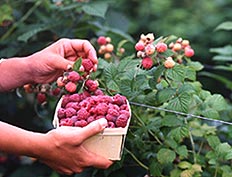
Raspberries are so delicate and perishable they're scarce at the supermarket and fruit stands and expensive if you find them. Fortunately, they're easy to grow at home. Although naturally adapted to a cool climate, varieties have been developed for virtually all parts of the country. Besides the familiar red varieties, there are also black, purple, and yellow ones. Black raspberries, or "blackcaps," have a distinctive and slightly musky aroma and taste. They're good eaten fresh, and they make great jams and desserts. Purple raspberries are vigorous red-black hybrids with an unusual flavor richer than a blackcap. Purples process well; eating out-of-hand is often an acquired taste. Yellow raspberries are a variation on the red but can be even more tender and sweet. Most varieties bear one crop in the summer soon after the strawberry harvest ends. Certain varieties known as everbearers or fall-bearers bear twice each year, midsummer and fall. A well-tended raspberry patch can thrive indefinitely.
Selecting Varieties
The first step is to select a variety that's right for your region. Check with your county Extension Service for varieties adapted to your region. You can save money by digging plants from a friend's patch, but there is always the risk of acquiring diseased plants when you get them secondhand. Infected plants usually have reduced vigor and may decline after only a year or two. There may be no obvious, visible symptoms until that occurs. A safer bet is to buy certified virus-free plants from a nursery. Black raspberries are by far the most vulnerable to disease. To avoid problems, buy plants from nurseries that use tissue culture propagation. These plants are not only virus-free, but also free of all other diseases. While this precaution is a good idea for all types of raspberries, it's less critical for red raspberries, which are naturally more vigorous, and purple raspberries, which can be the most vigorous and disease resistant of all. But when it comes to blackcaps, tissue culture can make the difference between a bountiful crop and a trickle of berries.
For information on planting and care of raspberries, visit our Fruit Guide.
Photography by National Gardening Association.
 Victory Seed Company has all the seeds you want for your best garden in 2024.
Victory Seed Company has all the seeds you want for your best garden in 2024.
For 25 years, the family-owned Victory Seed Company has provided the highest quality vegetable, herb and flower seeds to families across the country. We are passionate about providing you the best seeds available that give excellent germination, robust plants, and the harvest you want. With a catalog of over a thousand varieties, we have everything, and our prices are the kinds that we'd want to pay. We have hundreds of yesterday's heirloom vegetables, as well as today's award winning hybrid selections. Get to know us by visiting our website and browsing through our online vegetable seed catalog.